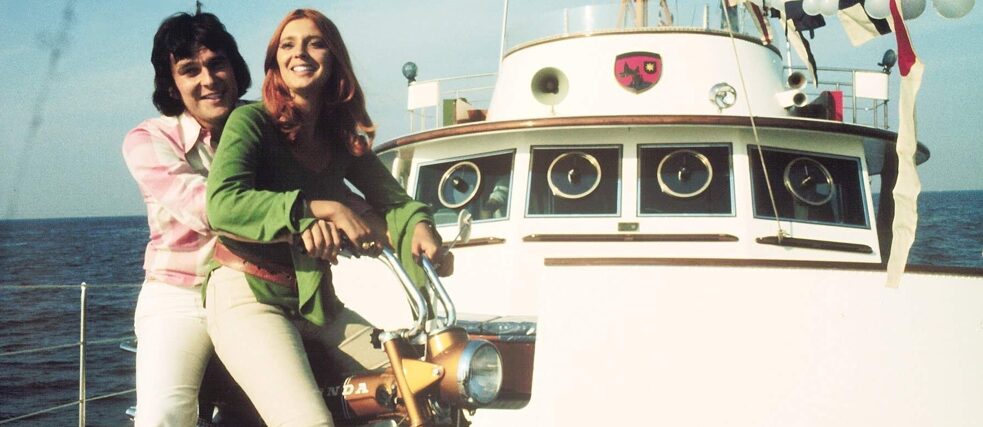SoundBites
Clap-Along Songs Win the Day

Visionary songs that only retrospectively hit the right note for their time often run the risk of flopping in the present moment. That’s what happened in 1971 to the song Der Hund von Baskerville by hit duo Cindy & Bert. There’s a story to tell about this, which extends from the German Romantic period to the present day, and from Völklingen in Saarland to Beverly Hills, California.
By Linus Volkmann
It’s like a scene from a home video blooper collection: a man flops into a chair, he’s on camera only by chance. The chair tips back alarmingly, he makes one last attempt at recovering his balance – in vain: gravity does its work.
The year is 2002, we’re in Beverly Hills and the man who has just involuntarily landed on his backside in front of the camera on MTV is none other than British-born Ozzy Osbourne, a naturalised American citizen. This would become probably the most iconic moment from the globally successful reality TV series The Osbournes. But along with Ozzy’s tumble, the principle of international superstardom comes back down to Earth as well, and enters a new era: in place of adulation, from the new millennium onwards it's all about trivialisation. The fallen MC of hard rock huffs, the film crew sniggers, one of the family dogs wags its tail.
 Not always firmly in the saddle: Ozzy Osbourne (here with daughter Kelly on "Wetten, dass..?", 2003) | © picture-alliance / Sven Simon
Not always firmly in the saddle: Ozzy Osbourne (here with daughter Kelly on "Wetten, dass..?", 2003) | © picture-alliance / Sven Simon
After all, German-language music during this time – East as well as West – is primarily influenced by “Schlager” hits. Roy Black spends two months at the top of the singles chart in 1970, the Paranoid year, with a song entitled Dein schönstes Geschenk (Your most beautiful gift). The GDR music scene is also characterised by feel-good tracks like Links von mir, rechts von mir (On my left, on my right) – a duet between Frank Schöbel and Chris Doerk – escapism through pop music.
Younger generations with an interest in beat music other than soothing poetry album lyrics have to look across the Channel and across the Atlantic. There are only a few performers who try to carve out new opportunities in the German “Schlager” hegemony. One attempt to go beyond scene and underground music that remains unique to this day comes from the duo Cindy & Bert: they cover Paranoid shortly after its release. Their German-language version comes out in 1971 under the title Der Hund von Baskerville (The Hound of the Baskervilles).
This might sound familiar to some readers, bearing in mind that Jutta and Norbert Berger – a married couple from Völklingen in Saarland – were one of the most successful acts of the seventies. As Cindy & Bert they sell over 10 million records, their biggest hit is Immer wieder sonntags (Every Day is Sunday) in 1973. They are representative of the agreeable “Schlager” pop songs customary in the post-economic miracle era and are a comfort blanket for those middle-class neighbours, who like to whistle a merry tune while they do their gardening. But although Immer wieder sonntags is so canonical in character – there is even a long-lived “Schlager” show on ARD named for the song – the track Der Hund von Baskerville is far more fascinating.
The single sells for up to 300 euros on the Discogs music marketplace. The number of potential buyers exceeds the number available six times over. If you count up all the YouTube views of the various Baskerville versions, the total is in the millions. So what sort of song is it? The music is simply a copy of the English original. Cindy & Bert aren’t turning the bass-heavy rock sound into a consumer-friendly sanitised version with a folky vibe. The text however is not a translation, it’s more of a doom-laden penny dreadful that flicks between Arthur Conan Doyle’s Sherlock Holmes stories and steamy German Romanticism.
“Fog drifts in thick swathes
Over the moor of Forest Hill
Green-ghostly grins a will-o'-the-wisp
It is night-time in Baskerville”
The hybrid of German Romantic literature and English rock music falls flat with modern-day audiences though. The song meets with little more than moderate acclaim and does not enter the charts. In fact, with regard to the duo’s later career it will serve only as an antithesis.
“Our producer convinced us that we needed something like Immer wieder sonntags. He had said ‘if that doesn’t end up being your biggest hit, then we’ll only produce music that’s your number one choice.’ [...] But I must say, that wasn’t a distortion of facts, the truth is that being there for the public and realising how much joy we were bringing to so many people made it fun for us as well,” says Cindy Berger in an interview. And if she seems a little wistful when she says she would rather have achieved this success with songs that “sounded different”, it’s clear that she’s primarily referring to Der Hund.
After all, Cindy & Bert wanted to translate international rock into German and bring the panache of Ozzy Osbourne to the ZDF hit parade. The idea was a good one, but the (German) world wasn’t ready at the time. So in future they shelve their USP and deliver songs – both successful and now forgotten – with titles like Spaniens Gitarren (Spanish Guitars), Rosen aus Rhodos (Roses from Rhodes) or Wenn die Rosen erblühen in Malaga (When roses bloom in Malaga).
“And not a soul dares to go
Into the dark moor
Everyone trembles for their life
Who will be next?”
Incidentally: at the end of their career, Cindy & Bert mirror their one-time hero Ozzy Osbourne once more. Just as reality TV provided him with a retirement income in the twilight of his fame, the two singers from Saarland are embarking on a 24/7 camera surveillance experience: in 2006 they move into RTL2’s Big Brother village. But, as already happened with their Ozzy adaptation in 1971, they were once again unable to match the charisma of the English original. At least they didn’t fall quite as flat as Ozzy did, though.